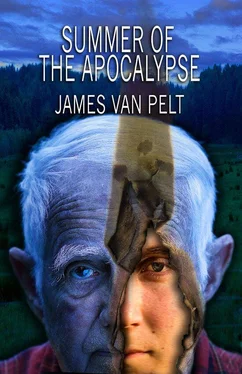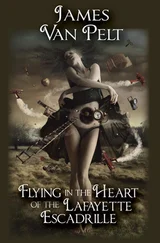“I have concluded that rational thought must argue all of the rest of human kind is dead. The planet is empty of intelligence except for this narrow strip in the Rocky Mountains,” said Pope.
“That doesn’t make sense. Why would we be the only ones left? Diseases don’t strike geographically.” Eric searched for an argument. Surely Pope must be wrong, he thought. Surely more than a few hundred people survived. But he thought again of Littleton’s isolation. Why hadn’t they been contacted? Where had all the young explorers gone? He said, “It didn’t miss Colorado. So many died here too!” Eric remembered sitting on his porch in Littleton the last few years. As the sun dropped below the peaks and cast their long shadows across the plains, he’d imagined little communities like his own, dotted across the country. Only space and the need to attend to the daily needs of survival kept them isolated. But the sense of those other people, the sure faith in their existence, had inspired him as he rocked in his chair watching the eastern horizon darken. A wall of pink-lined clouds had caught the last of the sun; an evening breeze ruffled the edge of the blanket he’d draped on his lap. He had been resting from a long day. We’ll fill the highways again, he’d thought. We’ll expand ourselves and be great again. Humanity has been set back, but this is only temporary. Knowledge will heal and bind us. He was ashamed to remember he’d then thought that the plague might have been a good thing. He’d thought that before, too. We were close to killing ourselves at times. Overpopulation, territorial jealousies, friction over historical occupation of the land had caused war and suffering. As the last of the sun edged the mountains pink, he’d thought, no one’s shooting at each other in the Golan Heights. They aren’t lobbing Molotov cocktails in Dublin anymore.
He said, “Why might they all die everywhere else?”
Pope cut the power to the radio. “The plague began it, but my guess is we did the rest ourselves. Various, persistent toxins, I believe, both nuclear and chemical. At least in the Rocky Mountain region, the water table has gotten worse. The farther from the Continental Divide, the worse it is. The community in Commerce City, for example, drank from a water supply that had become increasingly poison. Too much upstream: rotting, underground gasoline tanks, stored pesticides and chemical solvents that were leaking from their barrels. I don’t know what all caused it. Maybe just buildings and cars and roads melting back into the land.”
With one push on his wheels, he crossed the room, opened a cabinet and took down what looked like a walkie-talkie, but where Eric expected to see speakers, there were instead several switches. Pope shrugged wryly. “It’s a poetic image, don’t you think? All our cities and factories, houses and stores, dissolving in the rain like sugar cubes, and all their toxins stored within and beneath them letting go, one corroded storage container after another. In Commerce City, the people were getting sick. Babies miscarried or were born deformed. I sent them into the mountains.”
“That’s what’s happening in Littleton too. Is it our water?” Eric thought of the South Platte that ran by the edge of town. Most water came from there, but the stream had been crystal clear for years, its water sweet and cool. “Should we move up into the mountains too?”
“Mountains may be the last to go, but they’ll go if the pollution continues.” Pope linked his fingers across his chest and closed his eyes, squeezing a tear in their corners. “It’s getting worse, I told you. We started measuring here thirty years ago when we began losing contact with other survivors. The water table’s going bad, and the lower in elevation you go, the higher the toxin level is. I can’t tell from here—there is no way to know without sending an expedition—but the seas may be sick. Nothing is more downstream than the sea.”
Ripple’s words about upstream and downstream came back to Eric. She’d said of the Gone Timers,
“They took upstream and disposed downstream like upstream was forever and no one lived below.” In the background, an amplified voice started shouting again, but the words were indistinct in the windowless room. Raising a hand, Pope pointed to a chart hung on a wall. “Somehow we poisoned the water, and if the sea dies, we will die too. Most of our breathing air comes from ocean-based photosynthesis, but I’ve been graphing other changes in the air.”
A timeline marked the bottom of the chart, and a line starting at five years after the plague climbed like stair steps to today. In the last five years, the steps came closer together.
“What’s being measured here?” asked Eric. His thinking centered on Pope’s last words. Surely he is wrong, thought Eric. The water table may be polluted, but it has to vary! A local problem in some places maybe, but not a global one—not one that could take in the sea. In the books somewhere there must be a solution!
Outside, the voice shouted incessantly. Pope twitched a finger toward the main library area.
“Push me, would you? My arms aren’t what they once were, and we need to keep an eye on him.” Grabbing the handles, Eric maneuvered the chair through the door and toward another muslin-covered window. When they reached it, Pope plugged an AC adapter from the walkie-talkie into a wall socket. On the quad below, the pile of books had grown to several feet thick.
“Remember the nuclear accident at Chernobyl?” Pope waited for Eric to nod. “The graph shows the rise in air-borne radiation. The plague killed too quickly. Not all nuclear power plants around the world must have been shut down safely. What I think we are seeing here in each one of these jumps…” He drew in the air the stair steps on the graph. “… is a power plant losing containment. They are burning and pumping radiation into the atmosphere.”
An image of a slowly rising tide of poisons came to Eric. Each year his community could move higher, but in the end there would be no place to retreat to, and the air could kill them before they reached the top.
“Is this what you see?” asked Eric, thinking of his own vision. “That humanity is finished?” He thought, if all this is true, then why try to save the library? What’s to be gained? The last barrow full of books hit the pile, and soldiers scurried around the pod, picking up guns, heading this way and that. As if answering the thought, and not the question, Pope said, “As long as we live, we live. I have work to do here, and I am not ready to quit it quite yet.” He cranked open the small ventilation window that rested at the bottom of the tall, narrow expanse of glass so they could hear the loudspeaker. “Besides, I still want to deal with Federal.”
“But why?” Eric wanted to collapse. As quickly as the euphoria of seeing the books had come, the weight of his age had returned. “Why not walk away and give him the library if he’s going to die anyway?” Through the open window, the voice boomed, “Surrender the library or we burn the books.” Beside the stack, two soldiers stood with torches. Two others flanked them, their M-16s held ready at waist level. The rest had taken positions in the ditches; some pointed their guns at the library doors, while others watched the roof and windows.
Pope said, “Fairly illogical request, don’t you think? I know his intent is to burn these books too. He knows I know that. What makes him think the threat to burn part of the books would make me give him the rest?”
Eric gasped. “Not burn them. He wouldn’t destroy them. Wouldn’t he want to get their power, if that’s what he believes they represent?”
Pope fingered the switches on his walkie-talkie. In this pose, with the gauzy muslin-filtered light falling on him, he looked almost like a statue, something hewn out of white marble. “I imagine the librarian at Alexandria must have thought the same thought in ancient Egypt as the hordes descended.” His voice grew sarcastic. “‘Surely they won’t damage the papyrus scrolls! Surely they won’t destroy all of mankind’s learning.’” Pope barked out a short laugh. “They estimate a half-million documents were lost at Alexandria.”
Читать дальше












